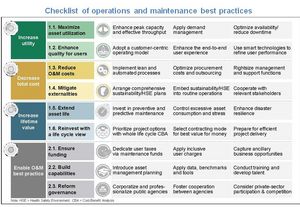PANAMA CITY, PANAMA--(Marketwired - Apr 2, 2014) - As countries worldwide experience severe infrastructure needs owing to growing populations, increasing urbanization, and aging legacy assets, a huge opportunity exists to address those needs through a faster, cheaper, and often overlooked alternative to new construction: optimizing existing assets through better operations and maintenance, according to a new World Economic Forum report, prepared in collaboration with The Boston Consulting Group (BCG).
The report, which is being released today at the World Economic Forum's regional meeting on Latin America in Panama City, outlines a comprehensive framework and a set of actionable best practices that governments can use to achieve a step change in how they run and keep up their transport, water, and power networks.
While demand for infrastructure is skyrocketing, supply is impeded by various factors, resulting in a global investment gap of about $1 trillion per year through 2030, according to the report. To bridge the gap, most governments emphasize constructing new assets, but this strategy has obvious limitations -- notably the huge expense, public-budget constraints, and lengthy timetables. A complementary and potentially more cost-effective approach is to improve the stock of existing infrastructure through operations and maintenance (O&M) best practices, the report says.
Drawing on more than 200 examples from the various infrastructure sectors, Strategic Infrastructure: Steps to Operate and Maintain Infrastructure Efficiently and Effectively identifies a multitude of actions that governments and infrastructure operators can undertake to make the most of what they already have.
"There are many examples of operations and maintenance best practices from around the world, and they need to be applied more broadly," said Dr. Philipp Gerbert, a BCG senior partner and coauthor of the report. "Preventive maintenance treatments for road pavements have reduced whole life costs by up to one-third. Digital technologies, such as remote sensing and advanced analytics, can allow traditional infrastructure to be operated and maintained more efficiently. Most important, O&M solutions are highly cost effective in an otherwise capital-intensive industry."
Even small O&M improvements can have a remarkable impact, Dr. Gerbert noted. "On a global asset base of $50 trillion, every percentage of improvement translates into billions of saved dollars. And beyond financial savings, O&M improvements can bring considerable social and environmental benefits."
The report examines two types of solutions: implementation best practices for asset operators to enhance O&M performance and enablement best practices for policymakers to create the conditions for sustainable O&M. The checklist below captures both and represents a holistic agenda for optimizing O&M.
Lee McIntire, Executive Chairman of CH2M HILL, a global leader in full-service engineering, construction, and operations, commented: "The sustainable O&M best-practices set forth in the report will be valuable for infrastructure assets across the globe, and can help drive economic growth in a socially and environmentally responsible manner."
While enhanced O&M is certainly a key means of narrowing the global infrastructure gap, the report acknowledges that it is no panacea. "Many countries, particularly in the developing world, will still need to construct new assets in order to address the vast infrastructure deficiencies," said Marco Airoldi, a BCG senior partner and coauthor of the study. "Still, by optimizing existing capacity utilization, best-practice O&M can at least reduce the amount of new construction. By optimizing operating costs, it can also free up financial resources for whatever new construction is needed. And, of course, it can ease current congestion far faster than new construction would be able to."
Such well-designed O&M strategies and policies offer both developed and developing countries a great opportunity for boosting their infrastructure, strengthening their competitiveness, and fostering socioeconomic progress, the study concludes.
A copy of the report can be downloaded at www.bcgperspectives.com.
To arrange an interview with one of the authors, please contact Eric Gregoire at +1 617 850 3783 or gregoire.eric@bcg.com.
About The Boston Consulting Group
The Boston Consulting Group (BCG) is a global management consulting firm and the world's leading advisor on business strategy. We partner with clients from the private, public, and not-for-profit sectors in all regions to identify their highest-value opportunities, address their most critical challenges, and transform their enterprises. Our customized approach combines deep insight into the dynamics of companies and markets with close collaboration at all levels of the client organization. This ensures that our clients achieve sustainable competitive advantage, build more capable organizations, and secure lasting results. Founded in 1963, BCG is a private company with 81 offices in 45 countries. For more information, please visit bcg.com.
About bcgperspectives.com
Bcgperspectives.com features the latest thinking from BCG experts as well as from CEOs, academics, and other leaders. It covers issues at the top of senior management's agenda. It also provides unprecedented access to BCG's extensive archive of thought leadership stretching back 50 years to the days of Bruce Henderson, the firm's founder and one of the architects of modern management consulting. All of our content -- including videos, podcasts, commentaries, and reports -- can be accessed by PC, mobile, iPad, Facebook, Twitter and LinkedIn.
Contact Information:
The Boston Consulting Group
Eric Gregoire
Global Media Relations Manager
Tel +617 850 3783
Fax +617 850 3701
gregoire.eric@bcg.com
